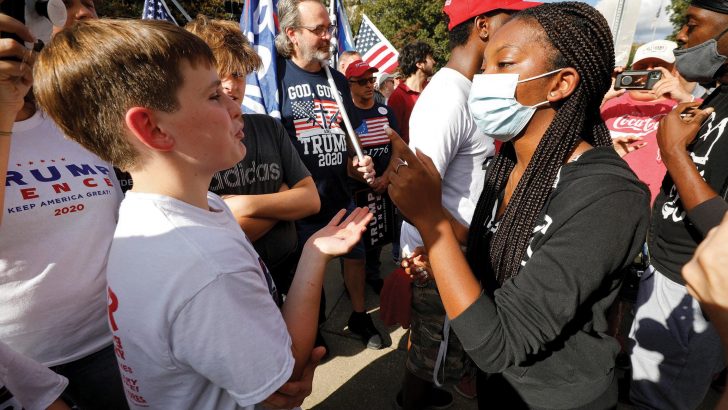Letter from America
Carol Zimmermann
The nation’s political divide was never going to be solved by the final tally of presidential votes or when the political signs came down.
And the talk of moving forward and finding healing, or at least turning down the vitriol, can seem an unsurmountable task for a nation still reeling from the pandemic, with its rising death count and economic fallout.
Catholic leaders have acknowledged the long road ahead and the need for calm resolve.
No one is saying there will be an instant “Kumbaya” moment of collegiality, but in discussion about where the nation stands right now, a U.S. woman religious and a bishop used that very word to describe where the nation definitely isn’t.
“I doubt that any of us expected to wake up on November 4th ready to hold hands and sing ‘Kumbaya’ with the neighbours whose yard signs offended us for the last several weeks,” wrote Bishop John E. Stowe of Lexington, Kentucky, in a November 4 statement.
Similarly, Sister Marcia Hall, vocation director of the Oblate Sisters of Providence in Baltimore, said prior to the election that even if it were to go smoothly, “we won’t all be holding hands and singing ‘Kumbaya,’ no matter who wins. … It’s going to take more than the election for us to start talking about coming together.”
Sister Hall and other women religious told Global Sisters Report, a project of National Catholic Reporter, no matter how the election played out, Americans would still have to find a way to live together, something that politicians can’t do for them.
Boston Cardinal Sean P. O’Malley, in a November 5 statement on the election, pointed to an ideal postelection view, but said it will take some work to get there.
“The task we face is not fully captured in the data, the numbers, charts and graphs, the task is also a spiritual challenge,” he said. And quoting Pope Francis’ recent encyclical “Fratelli Tutti,” he said people are called to promote “friendship and an acknowledgment of the worth of every human person, always and everywhere”.
“An election is never only about who wins and loses. It is always about a moment in time when a new beginning is possible,” he said, noting the nation is “now at a moment when a new beginning is not only possible but urgently necessary”.
The Boston archbishop said the work ahead “calls us to respect the opinions of others, to dialogue about differing perspectives, to seek reconciliation where there has been estrangement, to work for healing among the people of our country”.
That’s not all though. He also said it means not giving in to “resentments based in divergent political views and divisions that have emerged from the stress of recent months”.
This same idea was reiterated at a November 4 webinar at Le Moyne College in Syracuse, New York, about moving forward after the election.
Jesuit Father David McCallum, the school’s vice president for mission integration and development, said: “These times are not easy, loving those who hold very different perspectives than ourselves is not easy; loving at a time when the conditions don’t seem to support love is not easy and yet this is what we are called to.”
Dialogue with those we disagree with calls for humility, he said. He also said to give it time and that Thanksgiving dinner might not be the best day to start this.
Divisions were clearly pronounced in this year’s election, but they aren’t new.
The “Prayer after an Election,” in the 2007 “Catholic Household Blessings and Prayers” from the U.S. Conference of Catholic Bishops, seeks God’s blessing on the country and its leaders but it also prays for healing.
“Heal us from our differences and unite us, O Lord, with a common purpose, dedication, and commitment to achieve liberty and justice in the years ahead for all people, and especially those who are most vulnerable in our midst,” it says.
Many turned to prayer both before and after the election.
Manhattan College in Riverdale, New York, held a postelection interfaith prayer service for “Hope and Healing” November 4, bringing together students, faculty and staff outside the campus chapel. The service included a prayer for forgiveness for not living up to Gospel challenges, a Jewish prayer for the country and a passage read aloud from the Quran.
At the end of the service, participants recited together one of the prayers in the last section of “Fratelli Tutti,” where Pope Francis invites believers to ask God to “pour forth into our hearts a fraternal spirit and inspire in us a dream of renewed encounter, dialogue, justice and peace.”
CNS


 North Carolina supporters of President Donald
Trump and Democratic presidential nominee Joe
Biden argue after media declared Mr Biden had
won the presidential election.
Photo: CNS
North Carolina supporters of President Donald
Trump and Democratic presidential nominee Joe
Biden argue after media declared Mr Biden had
won the presidential election.
Photo: CNS 
